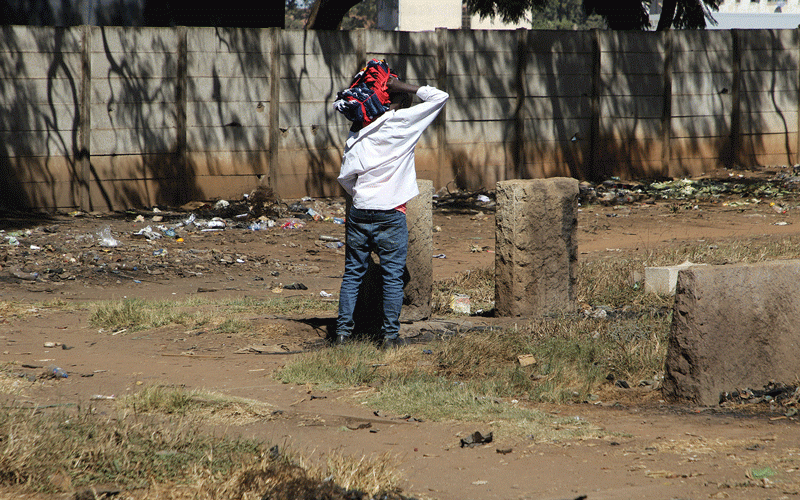
CEMETERIES, defined as sites where dead people are laid to rest, are usually known as places where silence eternally hangs heavy day and night.
But there is one cemetery in Harare where the dead must be silently turning in their earthen tombs. Here, gone are the days when sunlight dappled through ancient oaks, casting long shadows that danced with the quiet sorrow of mourners. Long past are times when headstones, weathered and worn, stood as stoic sentinels, whispering tales of lives past.
Harare (Pioneer) Cemetery has now turned into a network of pathways and chill spots for the care free, as it undergoes a chilling transformation. The composure it once held has given way to a disturbing bustle, the air thick with the murmur of conversations rather than occasional hushed prayers. Crumbling headstones, overtaken by weeds, now serve as makeshift seats, while tombs, once grand testaments to lives past, have become backdrops for impromptu picnics.
The path leading into the cemetery is no longer a reverent walk. It’s a bustling thoroughfare, a shortcut for pedestrians and a chilling spot for ghetto youths smoking dagga and inhaling crystal meth. Bluetooth speakers blare hip-hop tunes, their cheerful beats a stark contrast to the sombre purpose of the place.
Laughter mingles with the rustle of leaves, replacing the respectful silence that once reigned as some take a beeline to urinate or even defecate behind tombstones.
Vendors have set up areas to hide their products when they are being hunted by the city council. The aroma of fresh chips hangs heavy in the air, an unwelcome counterpoint to the filth and decay stench that eternally hugs the cemetery environ.
“I pass through the cemetery to and from work, there are lots of crossing road created by people who don’t want to use main roads,” a 27-year-old Glen Norah man Tafara Musa, who is in the business of buying and selling second hand clothes at Mbare bus terminus told NewsDay.
“I usually pass through this place around 7am and 7pm. It will be business as usual. Sometimes one can think that some people actually sleep here, Chinotyisa mabhinya kwete nzvimbo yevakafa iyi (the only scary thing about this place are robbers not the burial sites). But long back, it was so disturbing just to hear the news that someone in your neighbourhood has died, worse if it was someone close to you, we would spent days indoors,” Musa said.
- The brains behind Matavire’s immortalisation
- Red Cross work remembered
- All set for inaugural job fair
- Community trailblazers: Dr Guramatunhu: A hard-driving achiever yearning for better Zim
Keep Reading
Under the heavy cloak of darkness, groups gather for illicit gatherings, fuelled by cheap liquor and a morbid sense of thrill. The flickering mobile phone lights cast grotesque shadows on the headstones, and drunken laughter echoes through the silent tombs, a disrespectful serenade to the departed.
The reasons behind this transformation are complex. Poverty and overcrowding in Harare have pushed people to find unconventional spaces for leisure. The economic downturn has forced vendors to hawk their wares wherever there is a potential customer. Yet, there is a deeper malaise at play, a growing disconnect from tradition and a waning respect for the dead.
In an interview, Harare mayor Jacob Mafume said there is need to adjust modern technologies to monitor graveyards and restore the traditions which were once so important to the community.
“Technology has improved. Cameras are now a dime and a quarter dozen in China. The use of drones can be useful to monitor council properties and council premises,” Mafume told NewsDay.
“What we might have to do is to look at a bigger cooperation between the city council and the companies that bury people in the cemeteries, to see how we can create a perimeter fence and also a surveillance system that will allow for us to be able to monitor the goings on in the cemmetries. I think we just need to create awareness and invest a little in modern technologies,” he added
Meanwhile, the elders shake their heads in dismay.
They remember a time when the cemeteries were a place of reverence, a solemn ground where grief could flow freely. Now, they watch helplessly as the final resting place of their ancestors is desecrated, piece by piece.
Harare Cemetery stands as a cautionary tale, a unnerving reminder of what happens when tradition crumbles and respect erodes. Here, the dead no longer rest in peace, their slumber disturbed by the clamour of a living world that has forgotten its manners.
Veteran talk show host Rebbeca Chisamba said the new generation has developed a lack of respect to the extent that they take pictures with the dead during funeral body views.
“This thing of taking selfies with the deceased is something associated with cults and very difficult to understand,” Chisamba said.
“I think the way graveyards are being treated in our present day society shows lack of respect. Graveyards in our old culture were very sacred places because we believe it’s a place where the dead rest. According to our culture, the dead must be respected as they wait for whatever that will happen next.
“But what is happening nowadays is that people are creating roads to pass through graveyards doing their business shows that we have failed as humans. We should go back to the drawing board and start teaching the new generation the culture associated with death.
“That is why we call it last respect, to show that when people die they are given their last respect. Long back it was not easy to pass through graveyards even during daylight. Graveyards were believed to be associated with back luck and bad spirits which is why we had so much respect for the dead.
In our African culture, we give respect to both the dead and the living. Nowadays even to kill a human being it's no longer scary like before. Killing a human being was not just as easy as they are doing these days,” the veteran talk show host told NewsDay
Another veteran gospel singer and cleric Charles Charamba, who has grown to become one of the respected musicians in the country said: “Our society is growing impatient with its desire to prosper. Unnecessary pressure is mounting such that people are devising unfamiliar ways to achieve success. Some are getting too involved in ritual activities to the extent of tempering with graveyards at the recommendation of false prophets and unethically minded traditionalists”










